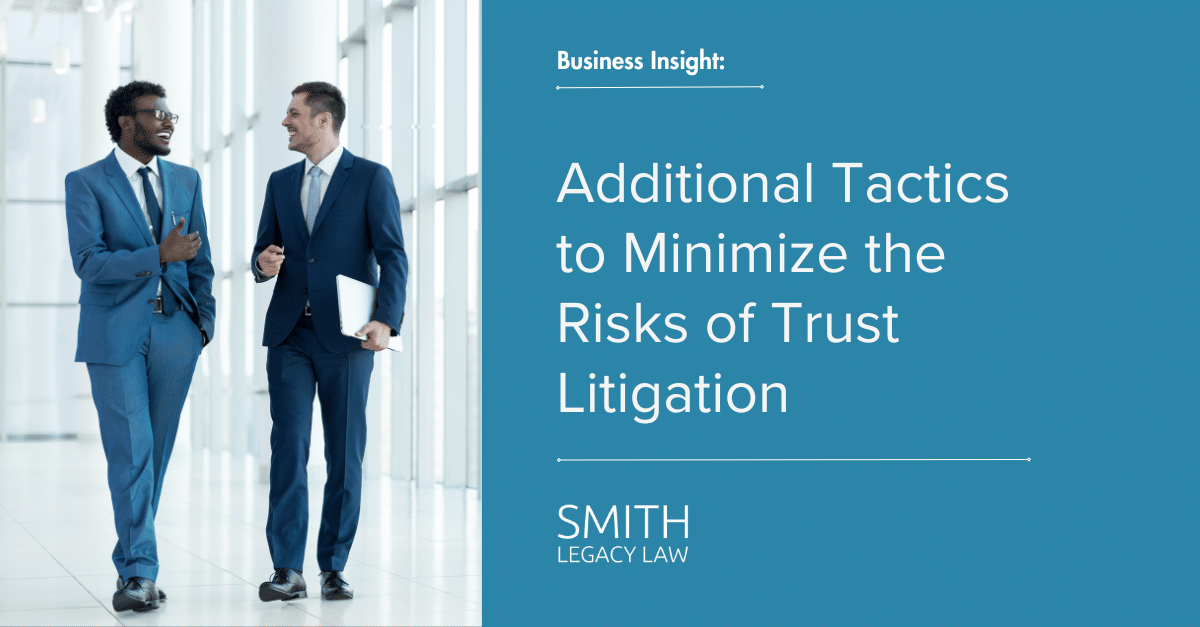Lawsuits by trust beneficiaries are a regular occurrence for several reasons. Often, it is because trusts involve families which means that there may be personal conflicts fueling the underlying litigation. Those issues may make it harder for the parties to settle their disputes amicably and they end up in court. The problem is that many of these suits have little legal basis, yet judges will refuse to dismiss them. As discussed in our prior post, Four Tactics to Help Minimize the Risks of Trust Litigation, U.S. courts allow plaintiffs to go to trial with minimal evidence of wrongdoing. This means defendants end up spending significant time and money to defend a frivolous lawsuit. While it’s impossible to prevent all lawsuits, we frequently employ trust drafting tactics that can help discourage people from suing.
What Tactics Can Help Minimize the Risks of Trust Litigation?
In our last post, we discussed four tactics to reduce the risks of a lawsuit, but there are additional strategies that can help accomplish that goal, including the following:
Add an attorney’s fees provision
Generally, under U.S. law, the parties pay their own attorney’s fees, unless there is a statute or agreement that provides otherwise. However, in other parts of the world, it is common for the losing party to pay the winner’s fees. The rationale is to discourage baseless lawsuits. If the loser has to pay the lawyers on both sides, they won’t sue unless they feel they have a strong case. Accordingly, a good practice is to include language in the trust that the losing party in a lawsuit or arbitration must pay the winner’s attorney’s fees.
Limit the types of claims that can be brought
Many states allow a trust to provide for limited liability of trustees. The trust can state that the trustee cannot be sued for “ordinary negligence,” but is only personally liable for gross negligence, recklessness, or wanton misconduct.
Create a “quiet trust”
Some states allow a grantor to create a trust whereby the existence of the trust and its beneficiaries are kept secret from the beneficiaries for a period of time, such as when the trust is to be distributed. Typically, the intent of such trusts is to allow the money to accumulate value for a period of time, during which distributions are prohibited. Then at a set time, the money is paid out to beneficiaries. Quiet trusts also serve to reduce litigation because the beneficiaries cannot sue if they don’t know about the trust and that they will be getting money in the future.
Limit the reasons distributions can be made
Trusts typically state under what circumstances distributions are made to a beneficiary. Litigation can be reduced by putting clear limitations on distributions. For example, one way is to simply have payouts occur at designated ages (1/3 at age 30, 1/3 at 40, etc.). However, that may discourage beneficiaries from working if they know they have guaranteed money coming to them. A better solution is to provide that payouts can only be made for specific reasons such as for the beneficiary’s health, education, maintenance, and support. Alternatively, the grantor can permit payouts to be made in the complete discretion of an independent trustee. In this way, beneficiaries cannot rely on the certainty of receiving the funds but there is less likelihood of litigation if the trustee is independent and not part of the family.
Trust litigation can be very costly as well as result in irreparable harm to family relationships, so it is essential to be proactive. The tactics discussed in this post and the prior one are not the only ways to reduce lawsuits. We work closely with clients to evaluate their circumstances and find the best solution for their unique situations. If you need assistance with a trust or estate plan, contact us for a consultation.
